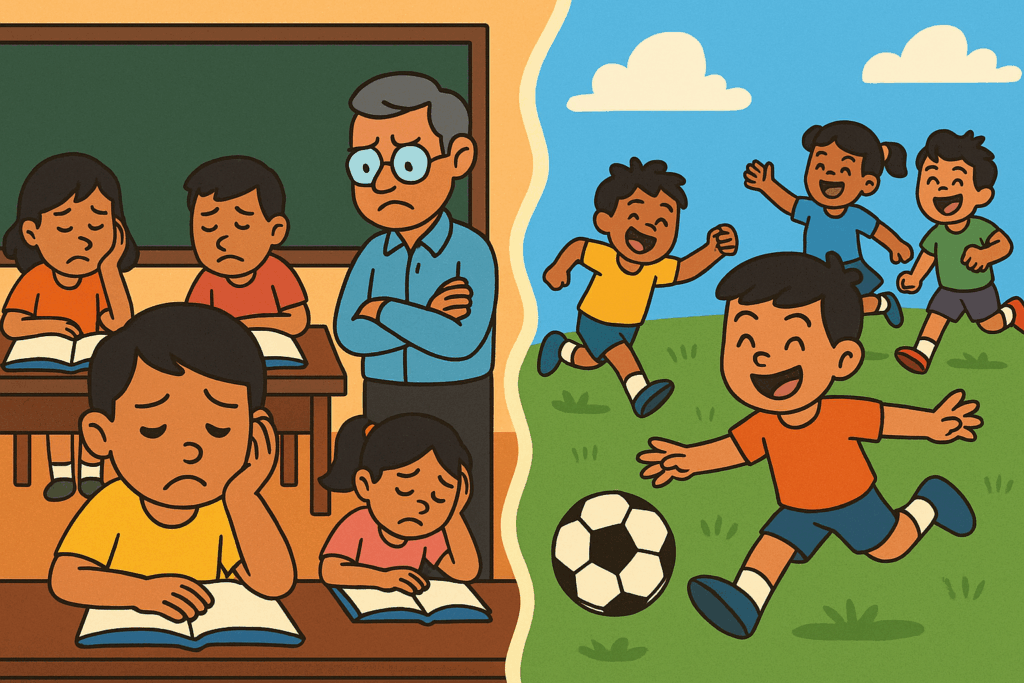Ever wondered why your child jumps out of bed for football practice but drags their feet when it’s time to study? In this insightful conversation, Dr. Malpani explores a powerful truth: the problem isn’t your child—it’s the system. By comparing how sports naturally foster curiosity, motivation, teamwork, and joy, we uncover what our education system is missing—and how digital learning pods are bringing that magic back into learning.

Parent: Dr. Malpani, I’m puzzled. My son wakes up early, laces up his shoes, and runs off to play football at 6 AM — rain or shine. But when it’s time to sit down and study, it’s like pulling teeth. Why are kids so motivated to play sports but so resistant to studying?
Dr. Malpani: That’s a very perceptive observation, and you’re not alone. A lot of parents share the same frustration. The truth is, your child isn’t lazy — he’s just telling you something important: learning in school is broken, while sports offer everything that school fails to deliver.
Parent: But isn’t school supposed to be where real learning happens?
Dr. Malpani: That’s what we’ve been led to believe. But let’s take a closer look. Why do kids choose to play sports, without any pressure or punishment? And why do they have to be forced to study?
The answer lies in intrinsic motivation. Kids play because they enjoy it. No one offers them marks, medals, or certificates — they just want to do it.
Parent: So you’re saying it’s not about discipline or parenting — it’s about how the activity is structured?
Dr. Malpani: Exactly. Sports are designed to bring out the best in kids. Let’s break this down.
1. Play to Your Strengths
In sports, kids naturally gravitate to roles that suit them. The fast kid becomes a striker. The strategic thinker plays midfield. The tall one defends the goal. No one is forced to be a goalkeeper just because they were born in June.
In school, it’s the opposite. Everyone is expected to be good at the same subjects, in the same way, at the same pace — regardless of their interests or abilities.
2. Coaching, Not Lecturing
A sports coach doesn’t drone on for 45 minutes while kids sit in rows. They give feedback, demonstrate, and let kids try things out. It’s dynamic, interactive, and personal.
Compare that to classroom lectures. One-size-fits-all. No room for curiosity or experimentation. Just memorize and regurgitate.
3. Team Spirit and Friendship
Kids love being part of a team. They support each other. Learn from one another. Cheer each other on.
In school? It’s every child for themselves. Marks and ranks pit friends against each other. Group work often turns into unequal loads. The joy of collaboration is lost in the race to come first.
4. Fun is the Default, Not the Exception
Sports are fun — not because they’re easy, but because they’re engaging. Kids enjoy the challenge. They laugh, fail, learn, and improve — all while playing.
School, on the other hand, has turned learning into a chore. It’s about pressure, punishment, and performance. Not joy, curiosity, or discovery.
5. Attendance is Optional — and That’s the Secret Sauce
No one forces kids to show up to football practice. They go because they want to. And because they know they’ll miss out if they don’t.
Imagine if learning were like that. If kids had the autonomy to choose what to learn, how to learn, and when to learn. They’d stop seeing education as a burden and start owning their growth.
Parent: But school has exams, curriculum, discipline. Isn’t that important?
Dr. Malpani: Discipline isn’t about sitting quietly in rows. Real discipline is self-discipline — the kind you see when a child wakes up at 5:30 AM to play a match. That’s what we need to cultivate — not blind obedience, but internal motivation.
Exams? They measure memory, not mastery. A footballer doesn’t take a written test to prove he can score a goal — he plays. Similarly, kids should be learning by doing, exploring, creating — not just by filling out worksheets.
6. Cooperation Trumps Competition
In team sports, the goal is shared. Everyone wins together. The defender’s role is just as important as the striker’s. Kids learn empathy, strategy, leadership — skills that truly matter in life.
In school, however, success is lonely. It’s about beating others. Even worse, it trains kids to fear failure instead of embracing it as part of growth.
Parent: I see your point. But what’s the alternative? I can’t just pull my child out of school and make him play all day.
Dr. Malpani: True. But you can create a better learning environment — one that takes the best of sports and applies it to academics. That’s what we’re doing through Teach to Earn Learning Pods.
Instead of lectures, we use AI tutors and interactive software. Instead of one-way teaching, we enable peer learning. Instead of forced curriculum, we let kids explore subjects they love. And just like in sports, kids learn at their own pace, guided by caring adult coaches, not authoritarian teachers.
And guess what? Kids start loving learning again.
Parent: That sounds revolutionary. But is it even possible?
Dr. Malpani: Absolutely. Hundreds of parents across India are already running these digital learning pods — right in their homes and communities. They’re affordable, flexible, and most importantly — they put children back in charge of their learning.
It’s time we stopped blaming our kids for not loving school — and started fixing the way we teach.
Take matters in your own hands by starting your own digital learning pod — your children will not get a second chance! 👉 https://www.teachtoearn.in/start-a-teach-to-earn-learning-pod/
